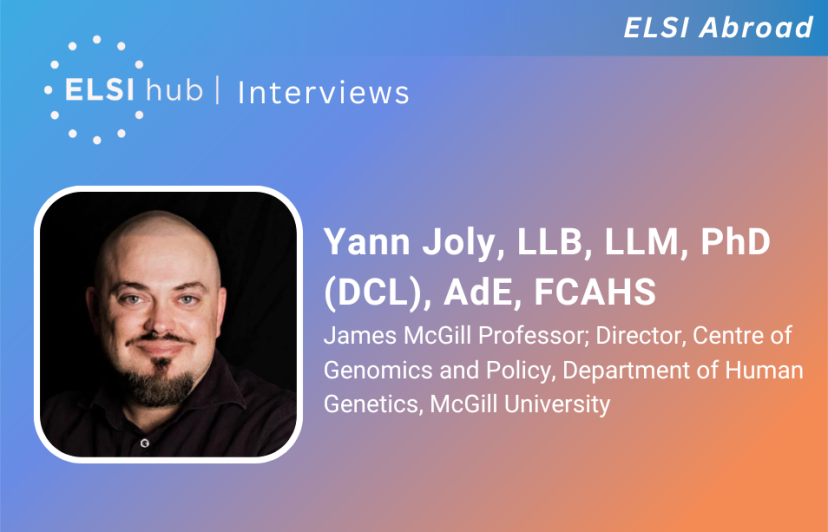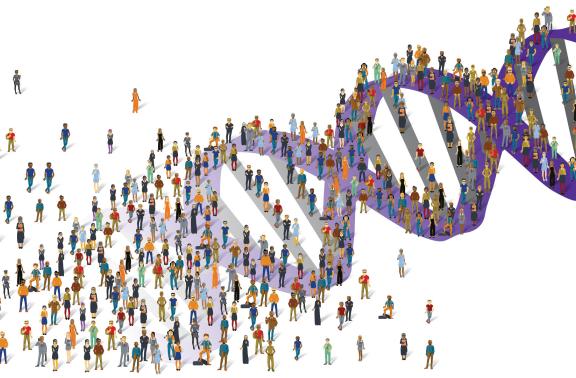
ELSI Abroad: Spotlight on Canada
The global effort to map and sequence the human genome was accompanied by initiatives in several countries that supported the study of its ethical, legal, and social implications or aspects. Over three decades later, ELSI studies have continued throughout the world, digging deeper into long-standing issues like genetic discrimination, shifting along the research pipeline to consider issues associated with the translation of genomic science, and expanding to include the examination of additional emerging technologies. With the aims of fostering a global perspective on the field of study and inspiring information sharing and collaboration across national borders, CERA has conducted a set of interviews with ELSI scholars who have a primary affiliation outside of the United States. We will share their insights in a series of features in this and future newsletters.
This first feature explores ELSI research in Canada through the eyes of Yann Joly, L.L.B., L.L.M., Ph.D. (DCL), Ad.E., FCAHS, James McGill Professor and Director of the Centre of Genomics and Policy (CGP) in the Department of Human Genetics at McGill University. Dr. Joly is the author of more than 250 peer-reviewed publications, many book chapters, and two books. His research spans health law related to biotechnology and other emerging health technologies, intellectual property, and bioethics. Among his many contributions are the development and implementation of controlled access mechanisms for two large, academic genomics consortia: the International Cancer Genome Consortium (ICGC) (for which he was the Data Access Officer from 2009–2018) and the International Human Epigenome Consortium (IHEC) (2015–2023). Dr. Joly is currently the co-lead of the Regulatory and Ethics Workstream of the Global Alliance for Genomics and Health. He has also provided expert testimony on genetic discrimination to both the Council of Europe and the Canadian Senate Standing Committee on Human Rights, and, among other honors and awards, is a fellow of the Canadian Academy of Health Sciences.
CERA: What inspired you to focus your work on the ethical, legal, and social implications of genetics and genomics?
Dr. Joly: I was inspired by my interests in law and its applications to science and society. It was clear to me early in my career that there was a need to examine the development of scientific advancements, especially in genetics and genomics, from a broader human rights and ethics policy perspective. This approach is very helpful to address the ethical, legal, and social concerns the application of technology poses with foresight. If advances of scientific progress are to be realizable by all, it will be important that a broad variety of academic disciplines collaborate closely instead of working in silos.
CERA: What are you working on right now?
Dr. Joly: My current research examines the ethical, legal, and social implications of genomics and other emerging health technologies from an interdisciplinary perspective. I am the Director of the Centre of Genomics and Policy, an organization that is at the forefront of exploring interdisciplinary approaches to matters of genomics research. Guided by three pillar human rights: right to science, right to health, and the right to non-discrimination or equality, the centre applies innovative approaches to address the ethical and legal implications of genomic technologies. Specific research projects that I have been involved in include: AI chatbot and ethics governance, genomic database consent, privacy and data sharing, access to affirmative healthcare for intersex persons, and more. I established the Genetic Discrimination Observatory (GDO) in 2020. The GDO examines all aspects of genetic discrimination defined as an ethical and legal issue where individuals or a group may be negatively treated, unfairly profiled, or harmed (relative to the rest of the population) on the basis of actual or presumed genetic characteristics. It is likely to occur most notably in the context of life insurance and employment. The organization brings together over 40 experts from 30 jurisdictions looking to apply multi-disciplinary perspectives to address genetic discrimination globally.
CERA: What can you tell us about ELSI research in Canada?
Dr. Joly: We have very high-quality academic scholars on this topic in Canada. Career opportunities are also quite good in this field now. While our research approaches and priorities are influenced by that of our southern neighbor, we also understand that our unique healthcare system and our European heritage require us to look beyond the U.S. at European and international developments in the field.
CERA: What would you say is the most important ELSI issue in Canada right now?
Dr. Joly: Despite growing interest from politicians and scientific researchers in matters of ELSI, funding remains rather modest for this type of research. The most challenging issue in recent years has been to define an ethical, participative, and functional approach to including Indigenous populations and other equity-seeking population groups in health research.
CERA: What ELSI issues do you see that would benefit from multi-country deliberation by ELSI scholars?
Dr. Joly: While most ELSI issues could benefit from multi-country deliberation, genetic discrimination (GD) is an ideal example. Experiences from Canada show that there is little awareness about GD from a patient perspective. Even when the Genetic Non-Discrimination Act was implemented in Canada in 2020, it was difficult to garner consensus around GD. Despite the need for laws and policies to address GD, my research has shown how stakeholders can circumvent legal provisions to access patients’ personal genetic information. Multi-country deliberation amongst scholars and other stakeholders is crucial to better understand the limitations of national approaches and fill these gaps with international good practices and patient empowerment through education.
CERA: What works of ELSI scholarship from Canada or other scholarly resources would you recommend to the global ELSI community?
Dr. Joly: I recommend the following resources.
- Knoppers, B. M., & Chadwick, R. (2005). Human genetic research: Emerging trends in ethics. Nature Reviews Genetics, 6(1), 75–79.
- Joly, Y., Dupras, C., Pinkesz, M., Tovino, S. A., & Rothstein, M. A. (2020). Looking beyond GINA: Policy approaches to address genetic discrimination. Annual Review of Genomics and Human Genetics, 21(1), 491-507.
- Illes, J., Schaffrick, M., Ravitsky, V., Meslin, E. M., Bubela, T., Chandler, J., Hoffman, S. J., Knoppers, B. M., & Upshur, R. (2022). Re-invigorating notions of a bioethics council for Canada in a new era of biomedicine. In Kaleidoscope on global bioethics (pp. 95–102). Conselho Nacional de Ética para as Ciências da Vida.
- Regulatory & ethics work stream (REWS). (2024). Global Alliance for Genomics and Health.
- Genetic Discrimination Observatory. (2024). Genetic Discrimination Observatory.
If you would like to be interviewed for a future installment of ELSI Abroad, please feel welcome to email us at [email protected]. Please see our other interviews in this series focused on ELSI research in Australia, Belgium, and the UK.


